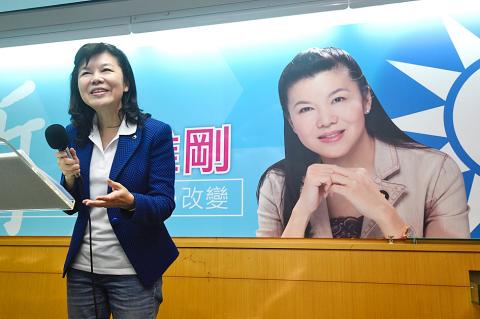The Chinese Nationalist Party’s (KMT) chairpersonship election has become even more competitive after former KMT legislator Pan Wei-kang (潘維剛) yesterday became the sixth to join the race.
Pan, a six-term KMT legislator and a three-term Taipei city councilor, announced her candidacy at a news conference in Taipei, which was attended by her supporters and several KMT politicians, including former KMT chairman Wu Poh-hsiung (吳伯雄), former acting KMT chairperson Huang Min-hui (黃敏惠) and KMT Legislator Alicia Wang (王育敏).
Former minister of transportation and communications Yeh Kuang-shih (葉匡時), who denied rumors he would enter the race, was also at the news conference.

Photo: George Tsorng, Taipei Times
“People asked me why I chose to step forward... I stepped forward because I believe only actual participation can allow changes to be made,” Pan said, adding that she did not think the competitiveness of the race would be detrimental to party solidarity.
Pan said that at a time when President Tsai Ing-wen’s (蔡英文) administration has destabilized society and caused cross-strait ties to deteriorate with its problematic policies, the KMT must help maintain checks and balances.
If elected, Pan said she plans to launch a reform movement within the KMT, as the party is losing supporters and facing its most dire predicament since its establishment.
She said she would also ensure that the KMT nominates candidates in all electoral districts in next year’s local polls, even in traditionally challenging ones.
Shrugging off speculation that her candidacy is aimed at jeopardizing KMT Chairwoman Hung Hsiu-chu’s (洪秀柱) chances of winning, Pan said she had spoken to all senior party members — including Hung — before announcing her candidacy.
“My candidacy has been dogged by conspiracy theories ... but my main goal is simply to bring home all KMT members who have lost contact with the party. It [joining the election] was a decision made after thorough consideration,” Pan said.
The other five contenders in the May 20 election are Hung, KMT Vice Chairman Hau Lung-bin (郝龍斌), former vice president Wu Den-yih (吳敦義), former KMT vice chairman Steve Chan (詹啟賢) and former Taipei Agricultural Products Marketing Co general manager Han Kuo-yu (韓國瑜).
Official candidacy registration is to begin on April 17 and each prospective candidate is required to collect the signatures of at least 3 percent of KMT members.

A preclearance service to facilitate entry for people traveling to select airports in Japan would be available from Thursday next week to Feb. 25 at Taiwan Taoyuan International Airport, Taoyuan International Airport Corp (TIAC) said on Tuesday. The service was first made available to Taiwanese travelers throughout the winter vacation of 2024 and during the Lunar New Year holiday. In addition to flights to the Japanese cities of Hakodate, Asahikawa, Akita, Sendai, Niigata, Okayama, Takamatsu, Kumamoto and Kagoshima, the service would be available to travelers to Kobe and Oita. The service can be accessed by passengers of 15 flight routes operated by

GIVE AND TAKE: Blood demand continues to rise each year, while fewer young donors are available due to the nation’s falling birthrate, a doctor said Blood donors can redeem points earned from donations to obtain limited edition Formosan black bear travel mugs, the Kaohsiung Blood Center said yesterday, as it announced a goal of stocking 20,000 units of blood prior to the Lunar New Year. The last month of the lunar year is National Blood Donation Month, when local centers seek to stockpile blood for use during the Lunar New Year holiday. The blood demand in southern Taiwan — including Tainan and Kaohsiung, as well as Chiayi, Pingtung, Penghu and Taitung counties — is about 2,000 units per day, the center said. The donation campaign aims to boost

ENHANCING EFFICIENCY: The apron can accommodate 16 airplanes overnight at Taoyuan airport while work on the third runway continues, the transport minister said A new temporary overnight parking apron at Taiwan Taoyuan International Airport is to start operating on Friday next week to boost operational efficiency while the third runway is being constructed, the Ministry of Transportation and Communications said yesterday. The apron — one of the crucial projects in the construction of the third runway — can accommodate 16 aircraft overnight at the nation’s largest international airport, Minister of Transportation and Communications Chen Shih-kai (陳世凱) told reporters while inspecting the new facility yesterday morning. Aside from providing the airport operator with greater flexibility in aircraft parking during the third runway construction,

American climber Alex Honnold is to attempt a free climb of Taipei 101 today at 9am, with traffic closures around the skyscraper. To accommodate the climb attempt and filming, the Taipei Department of Transportation said traffic controls would be enforced around the Taipei 101 area. If weather conditions delay the climb, the restrictions would be pushed back to tomorrow. Traffic controls would be in place today from 7am to 11am around the Taipei 101 area, the department said. Songzhi Road would be fully closed in both directions between Songlian Road and Xinyi Road Sec 5, it said, adding that bidirectional traffic controls would